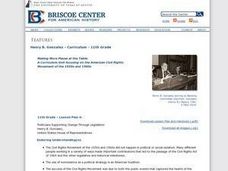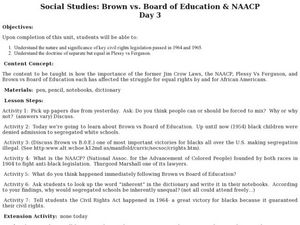Curated OER
Picturing Freedom: Selma-to-Montgomery March, 1965
Students analyze primary sources to investigate the Civil Rights Movement. In this Civil Rights lesson plan, students explore the passage of Voting Rights Act of 1965 and how photojournalism impacted the passage of the legislation....
US House of Representatives
Legislative Trends and Power Sharing Among Hispanic Americans in Congress, 1977–2012
Bilingual education, voting rights, and Congressional redistricting come up often in the news. Explore these topics from another view—the perspectives of Hispanic members of Congress. Activities include an article with comprehension and...
PBS
March on Washington: A Time for Change
Young historians conclude their study of the events that lead up to and the planning for the March on Washington. After examining videos and primary source documents, they consider the civil rights objectives that still need to be...
Museum of Tolerance
Making Lemonade: Responding to Oppression in Empowering Ways
An activity focused on tolerance encourages class members to consider how they might respond when they or someone else is the target of oppression and discrimination. After researching how some key figures responded to the anti-Semitism...
Curated OER
Paul Conrad's Perspective on Civil Rights
Students review a political cartoon and discuss desegregation. In this cartoon analysis lesson, 11th graders discuss the impact of a political cartoon and its relation to a Supreme Court case. Students read additional information and...
Center for History Education
Helping to Move On? An Analysis of the Reconstruction Amendments
Reconstruction amendments: a helping hand or another form of slavery? An inquisitive lesson compares the Reconstruction legislation that ended slavery, granted citizenship, and protected voting right for African American men. Scholars...
Curated OER
Making More Places at the Table: The American Civil Rights Movement of the 50's and 60's
Eleventh graders examine the biography of Henry B. Gonzalez. They examine primary source documents from Congressman Gonzalez's personal papers related to his contributions to the Civil Rights Movement.
Curated OER
Civil Rights and the ADA
Middle schoolers examine and discuss the 14th and 15th amentments, and evaluate the agendas of Americans from underrepresented groups in the quest for civil rights. They conduct Internet research and create essays or posters regarding...
Curated OER
Who’s Got Rights? An Introduction to Human Rights and Human Rights Defenders
High schoolers explore human rights issues. In this social justice instructional activity, students examine human rights as they read segments of the "Universal Declaration of Human Rights," discuss photographs with human rights...
Middle Tennessee State University
Fights, Freedom, and Fraud: Voting Rights in the Reconstruction Era
As part of a study of post Civil War era, young historians investigate the changes in voting rights during the Reconstruction Era (1863-1876), the fraud involved in the Hayes-Tilden presidential election of 1876, and efforts by Pap...
University of Arkansas
Assessment and Discussion
"Without concerned citizen action to uphold them (human rights) close to home; we shall look in vain for progress in the larger world. . ." Eleanor Roosevelt's comment is used to set the stage for the conclusion of a five-lesson unit...
Curated OER
Jim Crow Laws and The American South
Learners explore how Jim Crow laws affected the lives of people living in the south during pre and post-Civil Rights. Using a various research methods, students research various aspects of the Jim Crow south and complete a graphic...
Curated OER
Using High Stakes Testing to Make Students and Schools Accountable for Learning
Students conduct an informal survey about their views on high stakes testing and use basic computation skills to evaluate results as a group. They participate in activities related to high stakes testing and "No Child Left Behind"...
National Woman's History Museum
Women, Education, Sports, and Title IX
Title IX did more than change the face of sports in the United States. This landmark legislation also impacted women in education and politics. High schoolers examine the text of the legislation and the 2016 Senate resolution and watch...
Curated OER
Life Choices
By examining two differing perspectives on the topic of abortion, upper graders will be able to build an opinion of their own. A teacher-led lecture outlines key points in the debate for or against abortion including, the role of...
Carolina K-12
African Americans in the United States Congress During Reconstruction
The Civil Rights Act of 1866, which granted citizenship to all males in the U.S., resulted in the first African Americans to be elected to Congress. Class members research 11 of these men, the challenges they faced, and craft...
Curated OER
Brown vs. Board of Education and NAACP
Eleventh graders examine the issues surrounding Brown vs. Board of Education. In this American Government lesson, 11th graders study the key civil rights legislation passed in 1964 and 1965.
Curated OER
Writing Letters for Human Rights
Students draft and edit a letter regarding human rights. They work in groups to select a cause, follow basic letter writing guidelines and draft a persuasive letter expressing their concerns. Students can also send the letters to a...
Anti-Defamation League
Shirley Chisholm: Unbought, Unbossed and Unforgotten
A 13-page packet introduces high schoolers to a lady of amazing firsts. Shirley Chisholm was the first Black woman elected to Congress, the first Black woman to run for President of the United States, and a leader of the Women's Rights...
C-SPAN
Presidential Veto and Congressional Override
One of the key powers of the executive branch is the president's ability to pass or veto legislation proposed by Congress. Congress, the legislative branch, on the other hand, can override a president's veto. Five film clips show how the...
Curated OER
Constitutional Amendments and Gay Marriage
High schoolers study the legal battles involving same-sex marriage. They examine primary sources and a video regarding the 14th amendment and its implications for gay marriage. They analyze a report of a California case that was sent to...
National Woman's History Museum
Ida B. Wells: Suffragist and Anti-Lynching Activist
Suffragette, investigative journalist, and civil rights activist Ida B. Wells is the focus of a lesson that has young historians study the work of this amazing woman. Scholars watch a video biography of Wells, read the text of her speech...
Curated OER
Ordinary People, Ordinary Places: The Civil Rights Movement
Students analyze Martin Luther King's message of nonviolent protest discover how individuals adapted his message to their own communities and situations.
University of Arkansas
Promises Denied
"Promises Denied," the second instructional activity in a unit that asks learners to consider the responsibilities individuals have to uphold human rights, looks at documents that illustrate the difficulty the US has had trying to live...

























